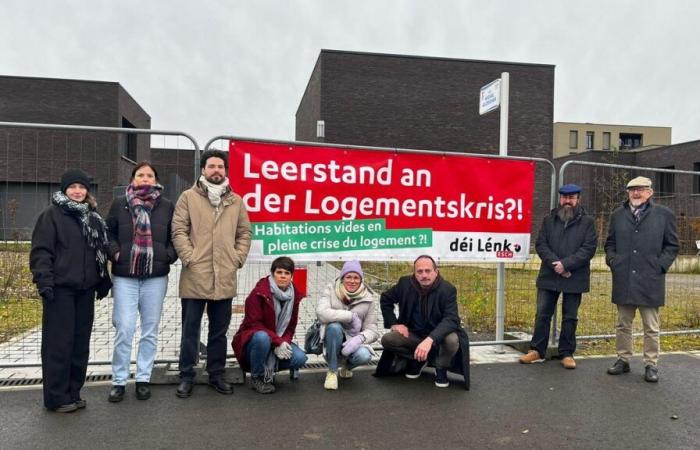For a year and a half, the CSV-DP-Déi Gréng Alderman’s Council of Esch-sur-Alzette has been trying to sell 36 long-term lease houses in the Nonnewisen district as affordable housing. With mixed success. Only six houses in the project, called 7N, have been sold so far, prompting the opposition party Déi Lénk to criticize the political majority in a press release on Monday and earlier in a protest action on place.
The Luxembourg word spoke with the spokesperson for the Déi Lénk parliamentary group, Marc Baum, as well as with the mayor Christian Weis (CSV), in order to situate the criticisms and reactions.
The problem in the Nonnewisen district is that too much emphasis has been placed on owned apartments and not on rental returns.
Marc Baum
Communal councilor chez Déi Lénk
Near the Luxembourg wordMarc Baum does not have such harsh words as in his party’s press release. There was still talk of “the sorry state of the Nonnewisen district” and the “ineffective housing policy” of the alderman’s council. “The main problem is the price,” he says. “The housing is certainly offered as affordable housing, but those who meet the required conditions rarely meet the banks’ conditions to obtain credit,” says Marc Baum.
According to Marc Baum, the current long lease model discourages many people who wish to buy not only for themselves, but also for their heirs. © PHOTO: Anouk Antony/Archives
Mayor Christian Weis approves of this assessment, but not Marc Baum’s conclusion. The latter asks the city to reconsider the conditions of sale. The mayor points out, however, that it is not the city, but the State which sets the conditions. Only up to a certain percentage of the number of housing units can the city change the use of buildings without violating state-imposed conditions and thus losing state subsidies.
“We are in a housing crisis”
Asked about a solution to the problem, Marc Baum replies: “The problem in the Nonnewisen district is that too much emphasis has been placed on owned apartments and not on rental returns.” So he’s proposing that the city build at least some of the homes that are completed, except for bathrooms and kitchens, fully ready for occupancy. In other words, it would be a question of equipping the accommodation each time with a kitchen and bathroom in order to then be able to rent them. According to Marc Baum, the current long lease model discourages many people who wish to buy not only for themselves, but also for their heirs.
Although the city has so far repeatedly launched calls to promote the houses, the target group who fulfills the conditions for habitable housing and at the same time has sufficient capital to be able to afford such accommodation is simply too small. “We are in the middle of a housing crisis and it makes no sense that 30 people are interested,” concludes Marc Baum.
We participated in trade fairs, organized open days and we entered into a sales partnership with the Housing Fund.
Christian Weis
Mayor of the town of Esch-sur-Alzette (CSV)
Mayor Christian Weis believes, however, that the criticisms and Marc Baum’s presentation do not go very far. “If we consider what the situation was when the political decision to build the 36 housing units was taken, it must be said that our conditions of sale are more than fair.” Back then, the situation was different and credits were even easier to obtain. The conditions agreed with the state provide that 60% of the apartments must be sold as “affordable housing”.
A change in sales prices within the framework of “affordable selling” would amount to a loss-making transaction. “Even if we wanted to, we would first have to check if we have the right to do so as a city,” explained the mayor.
Déi Lénk’s criticism is all the more strange because there are regular meetings of the Commission of Presidents, in which all the spokespersons of the political groups are represented and where these accommodations are also discussed. During these meetings, the different models were discussed. In addition to “affordable sale”, there are a multitude of other possibilities, such as “low cost sale” or hire purchase. Christian Weis considers this latter model to be very interesting, but unfortunately there are some legal uncertainties on this subject. “But we are in principle ready to discuss all possibilities within the framework of the Presidents’ Commission.”
“The problem is not the lack of attractiveness of the neighborhood”
“The next meeting of the Commission will take place in January, Mr Baum will then be happy to present his proposal,” says Christian Weis. However, it knocks an open door, because the next budget project already provides a certain budget to equip certain houses with kitchens and bathrooms.
Mayor Christian Weis points out that not all projects in the Nonnewisen district are experiencing sales problems. © PHOTO: Guy Jallay/Archives
But this would only be possible for a few houses, for the reasons already mentioned. Moreover, such work would be a costly affair under the public tenders required for this purpose. Christian Weis is counting on 70,000 to 100,000 euros per house.
Christian Weis also refutes the underlying charge that the city didn’t do enough to put the homes up for sale. “In a year and a half, we have participated in trade fairs, organized open days and we have concluded a sales partnership with the Housing Fund.”
Asked about his assessment of the situation in the Nonnewisen district, Marc Baum had previously considered that as a city, we needed to be more proactive if we really wanted to make this “social district” attractive. According to him, it is certainly commendable that a commercial premises was recently transformed into a relay house, but there is generally a lack of local businesses. “Perhaps we could, in collaboration with Transition Minett, install something like a mesa in the Nonnewisen,” he suggests, referring to the Transition House. At least until the neighborhood moves enough to interest other merchants.
Christian Weis explains on this subject that during the planning of the district by previous coalitions, rental contracts were always excluded. The new coalitions of the CSV, Déi Gréng and the DP have broken with this dogma. The problem would also not be due to the lack of attractiveness of the neighborhood, because another city project in Nonnewisen, the 6N project with 19 rental housing units and 26 triplexes, would not experience the sales problems of the 7N project.
This article was originally published on the website of Luxembourg word.
Adaptation: Mélodie Mouzon






